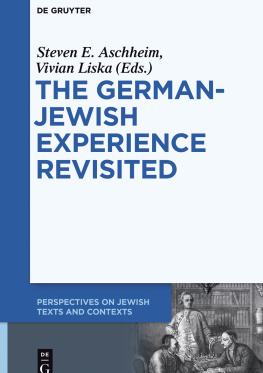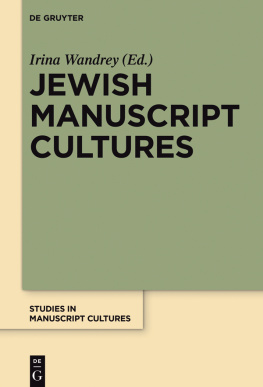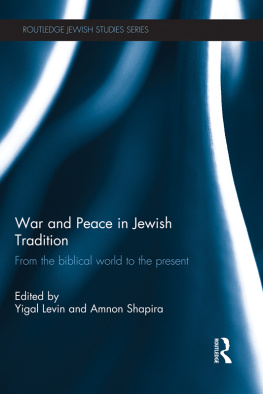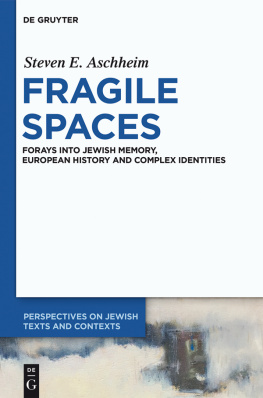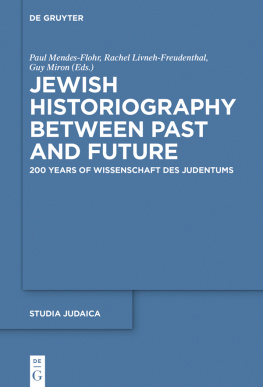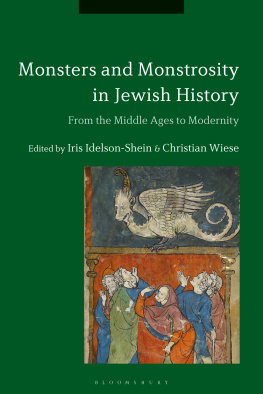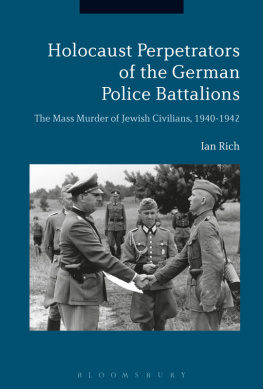The German-Jewish Experience Revisited
Perspectives on Jewish Texts and Contexts
Edited by
Vivian Liska
Editorial Board
Robert Alter, Steven E. Aschheim, Richard I. Cohen, Mark H. Gelber, Moshe Halbertal, Geoffrey Hartman, Moshe Idel, Samuel Moyn, Ada Rapoport-Albert, Alvin Rosenfeld, David Ruderman, Bernd Witte
Volume 3


In cooperation with the Leo Baeck Institute Jerusalem.
ISBN 978-3-11-037293-9
e-ISBN (PDF) 978-3-11-036719-5
e-ISBN (EPUB) 978-3-11-039332-3
ISSN 2199-6962
Library of Congress Cataloging-in-Publication Data
A CIP catalog record for this book has been applied for at the Library of Congress.
Bibliographic information published by the Deutsche Nationalbibliothek
The Deutsche Nationalbibliothek lists this publication in the Deutsche Nationalbibliografie; detailed bibliographic data are available on the Internet at http://dnb.dnb.de .
2015 Walter de Gruyter GmbH, Berlin/Boston
Cover image: bpk / Staatsbibliothek zu Berlin
www.degruyter.com
Preface
The essays in this volume derive partially from the Robert Liberles International Summer Research Workshop of the Leo Baeck Institute Jerusalem, 1125 July 2013. In addition to the papers presented at the workshop, we have included a few extra contributions that round out our reflections. The workshop and the present volume aim at revisiting interesting and important aspects of the German-Jewish experience and evaluating the present state of the field. Senior and junior scholars from Israel, Germany, and the United States all contributed to this work. We shall not summarize the arguments and theses of the essays in this collection. After all, what would be the point of reading them if one knows in advance what they are going to say? Readers will, no doubt, perceive some methodological, analytic, generational, and national divergences in these pieces but what emerges clearly is the ongoing vitality of this field, which in many ways is in transition. New paradigms, methods, and approaches co-exist with other more familiar and tried analyses. In the Postscript, we try to provide a retrospective account of the state of things as reflected in this volume.
We would like to acknowledge the generous support of the Leo Baeck Institute Jerusalem, particularly the encouragement and organizational help of Dr. Anja Siegemund. We are most grateful to Dr. Ulrike Krauss, our main contact person with our publisher de Gruyter for her commitment to the book series Perspectives on Jewish texts and contexts and for accompanying every stage of the production process of this volume. Above all, we want to thank Dr. Stefani Hoffman, who did much more for this book than her work as text editor would have required. With utmost professionalism and a fine sense for language, she painstakingly went through every line of the manuscript, suggested corrections and revisions at every level and contributed immensely to improving this book.
Contents
Ofri Ilany
The Jews as Educators of Humanity a Christian-Philosemitic Grand Narrative of Jewish Modernity?
In a 1988, 11). In Scholems description, the ideal of the Jewish mission was almost the only trace of Judaism left in his fathers way of life. The renowned scholar, however, was far from enthusiastic about this ideal. Scholem cites this remark as an example of his fathers typical shallow, bourgeois notion of Judaism.
Whether we accept Scholems judgment or not, this paragraph distinctively depicts the role of this ideal within the worldview of educated German Jews by the turn of the nineteenth century. The notion of the Jewish peoples universal mission is a most dominant theme in modern Jewish thought and culture from the time of the Haskalah, whose prevalence in the nineteenth and early twentieth century cannot be overestimated. The universal mission of the Jews is one of the grand narratives of modern Jewish culture.
The view of Jewish existence as an enterprise aimed at benefiting humanity played an important role in the formation of various modern Jewish identities. As (2008, 12), the discourse of the Jews contribution to civilization significantly penetrated the sense of self of many Jews and sensitized others, consciously and subconsciously, to confront the question, time and again, of their sense of belonging to a particular society. A collection of texts dedicated to this theme could form a rich anthology, as many of the major modern Jewish thinkers attempted to define the essence of Israels vocation.
Obviously, 1995, 198).
Simultaneously, from the middle of the nineteenth century, socialist, liberal, nationalist and other intellectuals proposed many non-religious versions of the Jewish mission. In place of monotheism, these programs hail other features of Jewish existence and attribute universal significance to Jewish culture, the Jews as nation, and individual Jews. A few distinctive examples demonstrate the diversity of this discourse: (1981) saw the role of the Jews in spreading primitive sexuality an antidote to the growing sexual repression in European society.
In this essay, I shall outline the genesis of the modern Jewish mission narrative. Actually, primitive theological views regarding the Jews role among the nations have a long tradition within Judaism ever since the biblical idea of or lagoyim (a light unto the nations), and later in Tannaic literature, in the notion of Torah for the entire world [Torah lekol baei olam] ( 1999). Variations on these notions appeared in medieval Jewish philosophy and in the kabbalistic literature, or even earlier. I should like to follow a different path, or different historical continuity, however, in tracing the genealogy of this concept a path that I consider more relevant to the German context. I argue that primarily Protestant writers of the Aufklrung conceived the view of the Jews as teachers of humanity. Broadly sketching the traditional Christian view of Israels chosenness, I shall present the transformation that this image underwent during the early modern age. I maintain that Gotthold Ephraim Lessing and other German Enlightenment theologians and philosophers forged the modern narrative of Israels universal mission, mainly in order to defend the biblical tradition against rationalist and deist criticism. Finally, I shall demonstrate how nineteenth-century Jewish intellectuals adopted this image, using it for their own ends.
1From Verehrung Gottes to Weltweisheit
As (2005, 16), until the end of the eighteenth century, Jewish history was regarded as the realm of Gods action for Jews and Christians alike. According to the traditional Christian concept of salvation history, the People of Israel were endowed with a definite, central role as Gods chosen people and as the first nation of believers. This view emphasized Abrahams universal role as the father of believers [Vater der Glubigen] , Gods instrument for delivering the true faith to humanity, that the blessing of Abraham might come on the Gentiles through Jesus Christ (Galatians 3:14). According to this notion, Gods covenant with Abraham inaugurated the third chapter in his relationship with humanity, following those with Adam and with Noah.
Next page
